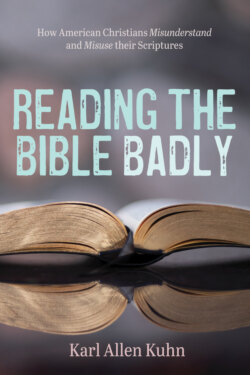Читать книгу Reading the Bible Badly - Karl Allen Kuhn - Страница 5
На сайте Литреса книга снята с продажи.
Acknowledgments
ОглавлениеPerhaps it is fitting that a book for the church should have its start in the church. Reading the Bible Badly began as a Monday night adult-education study of the same name at Grace Congregational United Church of Christ in Two Rivers, Wisconsin, in the winter of 2018. During our first session together, I noted how disturbing it was that so many of them were willing to come back to church on a cold winter night to learn how to read the Bible badly! But kidding aside, I am grateful for the many studies I have shared with this congregation over the years as together we have struggled to discern what it means to read the Bible, our faith, and the times in which we live well. I am also deeply appreciative for their continuing support of my ministry in the academy and the church, and the Grace Chair of Religious Studies which I am honored to hold at Lakeland University.
The twenty years and counting I have served at Lakeland have been a tremendous blessing. This liberal arts college related to the United Church of Christ, nestled among the farm fields of rural Wisconsin, has shaped my ministry of teaching and scholarship in profound ways. I have learned much from my colleagues and students. A sabbatical leave the fall of 2019 enabled me to complete most of the manuscript for this book. Then, in spring 2020 I shared a draft of the text with students in my “Interpreting Sacred Traditions” course, whose comments and encouragement gave me the sense that the work was on the right track and led to several improvements. Their names are Nicholas Broder, Kyle Ericsson, Nicole Herda, Mark Schmitt, Erin Tomlinson, and William Young. I also very much appreciate Lakeland librarian Jamie Keller, for the scores of inter-library loan requests he processed to support my research.
Others have also made valuable contributions to this book. My wife, Kathryn, a gifted UCC pastor and preacher, read through several chapters and encouraged my attempts to reach a general audience while cautioning me not to get too “gimmicky.” My sister, Louise Hubert, also commented on several chapters of the work. Her perspective was quite valuable as I sought to discern how the book might be useful to those on the more conservative side of our tradition. I am incredibly grateful for the tireless work of Kim Thimmig, who proofed and commented on the entire manuscript. Her efforts have improved the work in substantial ways.
Finally, I thank Wipf and Stock for this opportunity to publish under their Cascade imprint, and for the able work of their staff, including editor Rodney Clapp, whose expertise further improved the book and guided it to completion.
